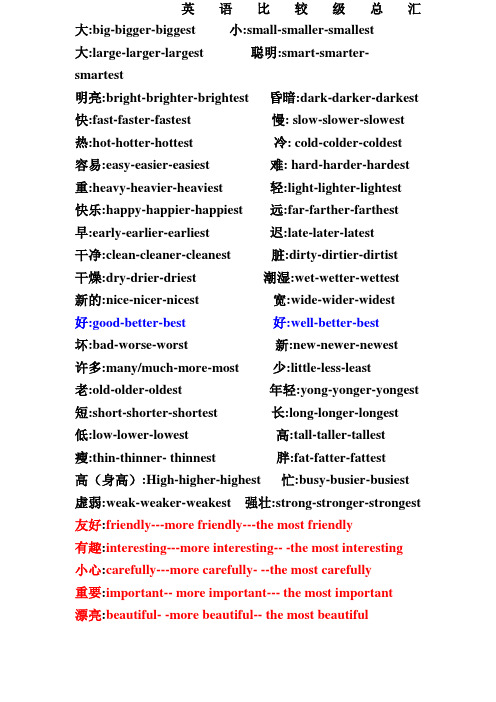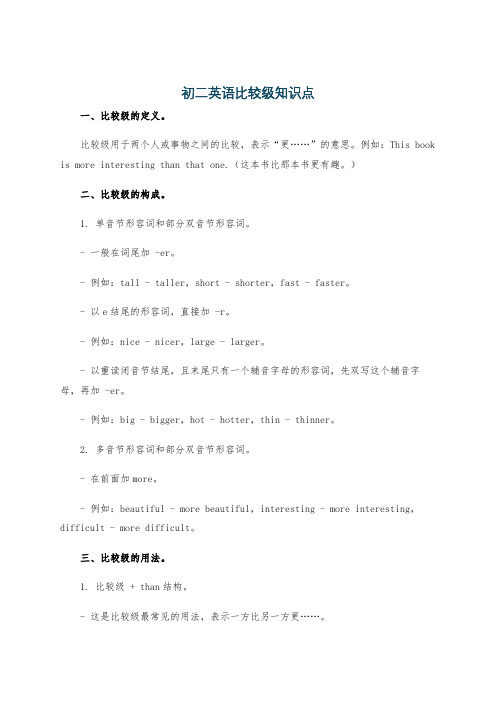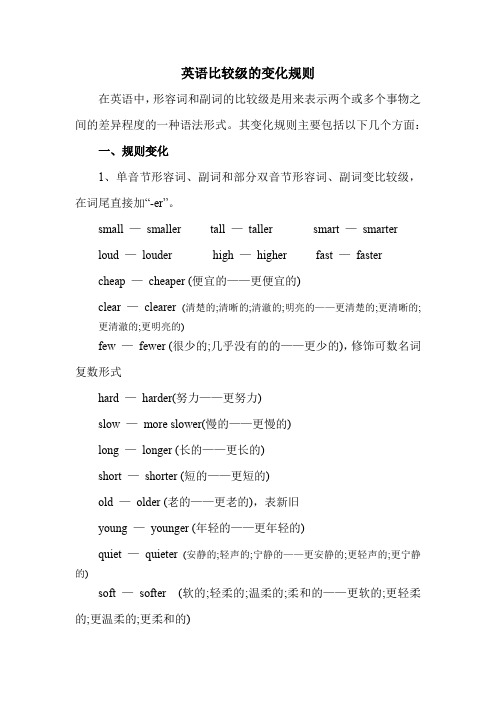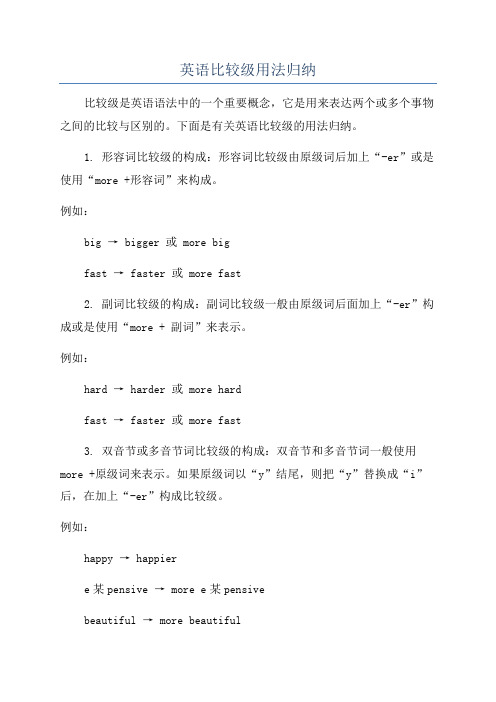英语中的比较级
英语单词比较级

英语比较级总汇大:big-bigger-biggest 小:small-smaller-smallest大:large-larger-largest 聪明:smart-smarter- smartest明亮:bright-brighter-brightest 昏暗:dark-darker-darkest 快:fast-faster-fastest 慢: slow-slower-slowest 热:hot-hotter-hottest 冷: cold-colder-coldest容易:easy-easier-easiest 难: hard-harder-hardest 重:heavy-heavier-heaviest 轻:light-lighter-lightest快乐:happy-happier-happiest 远:far-farther-farthest 早:early-earlier-earliest 迟:late-later-latest干净:clean-cleaner-cleanest 脏:dirty-dirtier-dirtist干燥:dry-drier-driest 潮湿:wet-wetter-wettest新的:nice-nicer-nicest 宽:wide-wider-widest 好:good-better-best 好:well-better-best坏:bad-worse-worst 新:new-newer-newest许多:many/much-more-most 少:little-less-least老:old-older-oldest 年轻:yong-yonger-yongest 短:short-shorter-shortest 长:long-longer-longest 低:low-lower-lowest 高:tall-taller-tallest瘦:thin-thinner- thinnest 胖:fat-fatter-fattest高(身高):High-higher-highest 忙:busy-busier-busiest 虚弱:weak-weaker-weakest 强壮:strong-stronger-strongest 友好:friendly---more friendly---the most friendly有趣:interesting---more interesting-- -the most interesting小心:carefully---more carefully- --the most carefully重要:important-- more important--- the most important漂亮:beautiful- -more beautiful-- the most beautiful。
英语比较级的含义

英语比较级的含义
英语比较级指的是对两个或多个事物进行比较时,用于表示其中一个事物相对于另一个事物的更高或更低程度的形式。
一般情况下,比较级在形容词、副词等词性的词前加-er构成,如taller (更高的)、faster (更快的)等。
在某些情况下,比较级可以通过在词前加more 或less来形成,如more beautiful (更美丽的)、less expensive (更便宜的)等。
比较级还可以用于表示数量上的比较,如more than (比……更多)、less than (比……更少)等。
在比较级的使用中,需要注意形容词和副词的词形变化规则,以及具体情境下的用法和搭配。
- 1 -。
初二英语比较级知识点

初二英语比较级知识点一、比较级的定义。
比较级用于两个人或事物之间的比较,表示“更……”的意思。
例如:This book is more interesting than that one.(这本书比那本书更有趣。
)二、比较级的构成。
1. 单音节形容词和部分双音节形容词。
- 一般在词尾加 -er。
- 例如:tall - taller,short - shorter,fast - faster。
- 以e结尾的形容词,直接加 -r。
- 例如:nice - nicer,large - larger。
- 以重读闭音节结尾,且末尾只有一个辅音字母的形容词,先双写这个辅音字母,再加 -er。
- 例如:big - bigger,hot - hotter,thin - thinner。
2. 多音节形容词和部分双音节形容词。
- 在前面加more。
- 例如:beautiful - more beautiful,interesting - more interesting,difficult - more difficult。
三、比较级的用法。
1. 比较级 + than结构。
- 这是比较级最常见的用法,表示一方比另一方更……。
- 例如:He is taller than me.(他比我高。
)- 在这个结构中,than后面可以接名词、代词(主格或宾格)、动名词或从句等。
- 例如:My mother gets up earlier than my father (does).(我妈妈比我爸爸起床早。
)- She runs faster than running in the rain.(她在正常情况下跑得比在雨中跑快。
)2. 比较级的特殊用法。
- “the+比较级,the+比较级”结构。
- 表示“越……,就越……”。
- 例如:The more you eat, the fatter you will be.(你吃得越多,就会越胖。
英语单词比较级

英语比较级总汇大:big-bigger-biggest 小:small-smaller-smallest 大:large-larger-largest 聪明:smart-smarter- smartest明亮:bright-brighter-brightest 昏暗:dark-darker-darkest快:fast-faster-fastest 慢: slow-slower-slowest热:hot-hotter-hottest 冷: cold-colder-coldest容易:easy-easier-easiest 难: hard-harder-hardest重:heavy-heavier-heaviest 轻:light-lighter-lightest快乐:happy-happier-happiest 远:far-farther-farthest早:early-earlier-earliest 迟:late-later-latest干净:clean-cleaner-cleanest 脏:dirty-dirtier-dirtist干燥:dry-drier-driest 潮湿:wet-wetter-wettest新的:nice-nicer-nicest 宽:wide-wider-widest好:good-better-best 好:well-better-best 坏:bad-worse-worst 新:new-newer-newest许多:many/much-more-most 少:little-less-least老:old-older-oldest 年轻:yong-yonger-yongest短:short-shorter-shortest 长:long-longer-longest低:low-lower-lowest 高:tall-taller-tallest 瘦:thin-thinner- thinnest 胖:fat-fatter-fattest 高(身高):High-higher-highest 忙:busy-busier-busiest虚弱:weak-weaker-weakest 强壮:strong-stronger-strongest友好:friendly---more friendly---the most friendly有趣:interesting---more interesting-- -the most interesting小心:carefully---more carefully- --the most carefully 重要:important-- more important--- the most important漂亮:beautiful- -more beautiful-- the most beautiful。
英语单词中的比较级

没有比较级、最高级的形容词和副词英语中,有些形容词和副词没有比较等级,这主要是由于本身词义的缘故,在语义上不存在差别,这类词可称为不可分级形容词或副词。
主要有下列几类:1、本身就有比较级含义的词:senior年长的、较高的,junior年少的、较低的,prior在先的,anterior前面的,inferior次于、下等的,superior优于、上等的,posterior以后的,major主要的,minor次要的、较小的。
在使用这些词时无须加more,也不能和than连用,而要用介词to引出比较对象(这种表示法也称为拉丁比较级)。
例如:Thissocial system is super or than that system. 这种社会制度比那种优越。
He issenior to me by several years . 他比我大几岁。
Hismethod of doing reserach work is hardly appreciated ;he feels inferior toothers. 他做研究的方法没人欣赏;他感到比别人矮了一截。
2、表示状态或情况的词:afriad害怕的,asleep睡着的,alive活着的,alike相象的,awake醒着的,alone单独的,aware意识到的,ablaze着火的,adrift漂流的,afire燃烧着的,astray迷途,aghast惊呆的,ashamed羞耻的,alight照亮,astire 引动起来,afoot活动着的,ashore在岸上的,agape目瞪口呆,awerse不乐意的,afloat浮着。
3、表示形状的词;round圆形的,circular圆形的,oval椭圆形的,square方形的,oblong长方形的,angular角形的,level水平的,horizontal水平的。
4、表示物质特征的词;atomic原子的,solar太阳的,physical物理的,organic有机的,economic 经济的,sonic声音的,scientific科学的,wooden木制的,earthen泥土的,golden黄金般的,woolen羊毛的,bronze青铜的,silver银制的。
英语比较级的变化规则

英语比较级的变化规则在英语中,形容词和副词的比较级是用来表示两个或多个事物之间的差异程度的一种语法形式。
其变化规则主要包括以下几个方面:一、规则变化1、单音节形容词、副词和部分双音节形容词、副词变比较级,在词尾直接加“-er”。
small —smaller tall —taller smart —smarterloud —louder high —higher fast —fastercheap —cheaper (便宜的——更便宜的)clear —clearer (清楚的;清晰的;清澈的;明亮的——更清楚的;更清晰的;更清澈的;更明亮的)few —fewer (很少的;几乎没有的的——更少的),修饰可数名词复数形式hard —harder(努力——更努力)slow —more slower(慢的——更慢的)long —longer (长的——更长的)short —shorter (短的——更短的)old —older (老的——更老的),表新旧young —younger (年轻的——更年轻的)quiet —quieter(安静的;轻声的;宁静的——更安静的;更轻声的;更宁静的)soft —softer (软的;轻柔的;温柔的;柔和的——更软的;更轻柔的;更温柔的;更柔和的)2、单音节形容词、副词和部分双音节形容词、副词变比较级,词尾若有哑音e,直接加r。
fine —finer (好的;纤细的;健康的;晴朗的——更好的;更纤细的;更健康的;更晴朗的)late —later (晚的——更晚的)nice —nicer (令人愉快的;漂亮的;友好的——更令人愉快的;更漂亮的;更友好的)wise —wiser (睿智的;聪明的——更睿智的;更聪明的)wide —wider (宽的——更宽的)safe —safer (安全的——更安全的)3、单音节形容词、副词和部分双音节形容词、副词变比较级,以重读闭音节结尾且末尾只有一个辅音字母,要双写末尾的辅音字母,再加er。
英语中常见的比较级和最高级的形式和用法

英语中常见的比较级和最高级的形式和用法在英语学习中,比较级和最高级是我们经常会遇到的语法形式。
它们用于比较两个或多个事物的程度、大小、数量等。
本文将介绍比较级和最高级的基本形式和用法,帮助读者更好地理解和运用。
一、比较级的形式和用法比较级用于比较两个事物的差异,表示一个事物相对于另一个事物来说更高、更大、更好等。
比较级的形式通常是在形容词或副词的前面加上-er,或者在前面加上more。
1. 形容词比较级的形式和用法形容词比较级的一般形式是在词尾加上-er,例如:taller(更高的)、bigger(更大的)。
但是也有一些特殊情况,需要在形容词前面加上more,例如:more beautiful(更漂亮的)、more intelligent(更聪明的)。
在使用比较级时,需要注意以下几点:a. 单音节形容词和部分双音节形容词在词尾加-er,如:fast(快的)→ faster(更快的),big(大的)→ bigger(更大的)。
b. 以字母e结尾的形容词,在词尾加-r,如:large(大的)→ larger(更大的)。
c. 以重读闭音节结尾的双音节形容词,需双写词尾的辅音字母,并加-er,如:big(大的)→ bigger(更大的)。
d. 部分双音节和多音节形容词需要在前面加上more,如:beautiful(漂亮的)→ more beautiful(更漂亮的)。
2. 副词比较级的形式和用法副词比较级的形式通常是在词尾加上-er,例如:faster(更快地)、earlier(更早地)。
与形容词不同的是,大部分副词比较级的形式都是在词尾加-er。
在使用副词比较级时,需要注意以下几点:a. 以字母e结尾的副词,在词尾加-r,如:late(晚地)→ later(更晚地)。
b. 以辅音字母+y结尾的副词,需将y改为i,并加-er,如:easy(容易地)→ easier(更容易地)。
c. 部分副词比较级形式不规则,如:well(好地)→ better(更好地)。
英语比较级用法归纳

英语比较级用法归纳比较级是英语语法中的一个重要概念,它是用来表达两个或多个事物之间的比较与区别的。
下面是有关英语比较级的用法归纳。
1. 形容词比较级的构成:形容词比较级由原级词后加上“-er”或是使用“more +形容词”来构成。
例如:big → bigger 或 more bigfast → faster 或 more fast2. 副词比较级的构成:副词比较级一般由原级词后面加上“-er”构成或是使用“more + 副词”来表示。
例如:hard → harder 或 more hardfast → faster 或 more fast3. 双音节或多音节词比较级的构成:双音节和多音节词一般使用more +原级词来表示。
如果原级词以“y”结尾,则把“y”替换成“i”后,在加上“-er”构成比较级。
例如:happy → happiere某pensive → more e某pensivebeautiful → more beautiful4.涉及到比较的句子结构:① 比较级+than+从句/名词/代词+原句例如:She is taller than her sister.My cat is smarter than any other animal in my house.② as+原级+as或not as+原级+as例如:John is not as tall as Michael.5.特殊形式:some比较级+ than others例如:Some people are more intelligent than others.the+比较级, the+比较级(越...越...)例如:6.比较级的用法:(1)比较大小、速度、强度、温度、价值、数量等。
例如:The weather today is colder than yesterday.The new car is faster than the old one.(2)表示相对的程度例如:She is more qualified for the job than him.The movie was much more e某citing than I e某pected.(3)表达一种变化或进程的态势例如:The traffic is getting worse and worse.My English is improving day by day.7.比较级的注意事项:(1)比较的对象应该是同一类词性。
- 1、下载文档前请自行甄别文档内容的完整性,平台不提供额外的编辑、内容补充、找答案等附加服务。
- 2、"仅部分预览"的文档,不可在线预览部分如存在完整性等问题,可反馈申请退款(可完整预览的文档不适用该条件!)。
- 3、如文档侵犯您的权益,请联系客服反馈,我们会尽快为您处理(人工客服工作时间:9:00-18:30)。
形容词与副词比较级讲解与练习
一、规则变化
1.一般单音节词未尾加-er,-est tall(高的) taller tallest great(巨大的)greater greatest
2.以不发音的e结尾的单音词nice(好的)nicer nicest large(大的)larger largest
3.双写结尾的辅音字母(辅+元+辅),再加-er,-est big(大的)bigger biggest hot热的)hotter hottest
4."以辅+y"结尾的双音节词,改y为i,再加-er,-est easy—easier--- easiest busy—busier--busiest
5.其他双音节词和多音节词,在前面加more,most来构成比较级和最高级。
important(重要的)more important most important easily(容易地)more easily most easily
二、不规则变化
good(好的)/well(健康的)—better--best bad (坏的)/badly(坏地)---worse--- worst
old (老的)--older/elder--oldest/eldest much/many(多的) –more--most
little(少的less least far (远的)farther/further farthest/furthest
用法
1. 同级比较两者相比(甲=乙),用“as+原级+as”
e.g. Tom is as tall as Jack She could do as well as a man. He runs as fast as I.
两者相比(甲<乙),用“not as(so)+原级+as”
e.g. She isn’t as(so) careful as you. I didn’t do my homework as carefully as you. He is not as tall as I.
2. 比较级用于两者或两部分间比较。
(1)两者相比(甲>乙),用“比较级+than”表示
e.g. This room is bigger than that one. I am taller than you. This lesson is more difficult than that one.
(2)表示“…不如…”,用“less+原级+than”结构
e.g. The book is less difficult than that one. The film is less interesting than that one.
(3)不与其他事物相比,表示本身程度的改变,用“比较级+and+比较级”结构,意思是“越来越…”
e.g. The weather is getting colder and colder. Our country is becoming more and more beautiful.
注意:修饰比较级的词有much, even, far, a lot, a little等,表示“……得多”,“甚至……”,表程度。
e.g. Today is much colder than yesterday.
附加:常见比较级五句型
1> Who / Which + be +比较级, A or B ?
Who is taller, Tom or John? Which is more expensive, a bicycle or a computer?
2> ~ + be + the 比较级+ of the two. (两个之中比较…的那一个,~包含在两个之中) Tom is the taller of the two. = Tom is taller than the other boy.
3> much / a lot / even / far + 比较级A compute is much more expensive than a bicycle. 计算机比自行车贵多了
4> "The+形容词比较级..., the+形容词比较级...", 表示" 越... 就越..."。
The more you study, the more you know. 你学的越多, 就知道的越多。
5> " 形容词比较级+ and + 形容词比较级", 表示" 越来越... "。
The computer is cheaper and cheaper.
3. 最高级用于表示三者或三者以上中的“最”。
A+be+ the+最高级+ in/of+表范围的短语e.g. He is the tallest boy in our class. He is the oldest of the three.
of 在……之中/之一in 在……范围之中
1> Who / Which + be +最高级, A, B, or C ? Which is the most expensive, a bicycle, a motorcycle, or a car? 自行车,摩托车和汽车,哪一个最贵?
2> ~ + be + one of the +最高级+复数名词, 表示"最……的……之一"。
The Yellow River is one of the longest rivers in China. 黄河是中国最长的河流之一。
3> "…+ be +the + 序数词+最高级+单数名词+ 范围", 表示"……是…….的第几……"。
She is the second tallest student in our class. 她是我们班第二高的学生。
